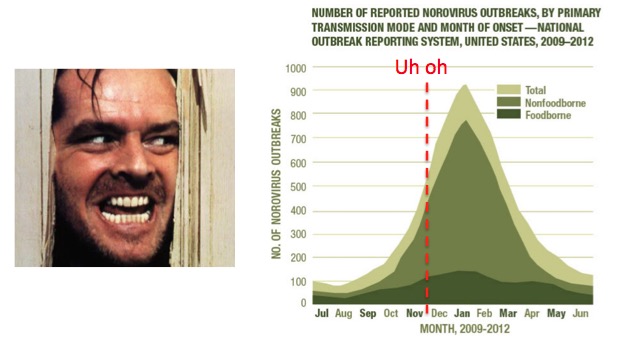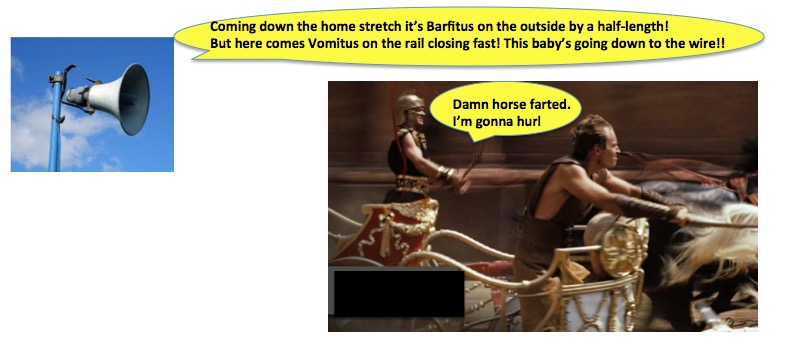Flu season is upon us. But so is another bug, which is misnamed the "stomach flu," (1) is about to hit. It's called norovirus, and it is one evil dude. Not only is it the most contagious virus in the world (2), it is also the second most common infectious disease in the US (20 million cases per year), which is topped only by the common cold. And this hideous entity is coming to get you as we speak!

Here's Johnny! Distribution of norovirus cases in the US by month between 2009-2010. It isn't called the "winter vomiting bug" for no reason. Source: CDC
So, you can bet the farm that we will soon be hearing the same old tips about how to avoid norovirus. Let's grade the advice from the "experts." Is any of it useful?
1. CDC
"Avoid exposure to vomitus or diarrhea"
Vomitus?? Are they kidding? No human uses this word. 'Vomit' would do the job perfectly well and would not conjure up the following image.

The epic race scene between Barfitus and Vomitus. Photo: YouTube
Grade: This one actually requires two grades. Let's give it an A for accuracy because avoiding vomitus is a very good, albeit self-evident idea, but a D (for Duh) because most people will not actively seek it out. Except maybe on dating sites.
2. WebMD (aka WebDUMB)
"Wash your hands often with soap and water for at least 20 seconds, especially after going to the bathroom or changing a baby's diaper, and before you prepare or eat food. Alcohol-based cleansers are not as effective as soap and water."
Grade: C Washing your hands for 20 seconds will get you clean hands so that you can hygienically hold onto the toilet when you're depositing your vomitus into it. Washing your hands is not nearly enough. Norovirus is spread in a number of different ways. One of these is airborne. And it can travel pretty far. There is a case study of the transmission of the virus throughout a restaurant after one of the diners puked on the floor (which is considered to be poor manners in certain cultures). People who were at tables that were not even close to the incident caught it. (See: To Avoid Norovirus, Keep Your Distance- Especially In Restaurants). So you can soak your hands in sulfuric acid (not recommended), but you're still gonna get sick if your kid brings it home from school. The reason the grade was not lower is that washing your hands can help prevent you from spreading it to others. Maybe.
3. "Crazy Joe" Mercola
It should come as no surprise that "Crazy Joe" is not a big fan of the medical establishment. But he sure likes selling crap that "supports" the immune system.
"Preventing the stomach flu involves keeping your immune system healthy by following these 10 tenets of basic health, along with a few common-sense precautions..."
What are those 10 basic tenets? Well, since you asked...
Eat a healthy diet that’s right for your nutritional type (paying very careful attention to keeping your insulin levels down)
Drink plenty of clean water
Manage your stress
Exercise
Get appropriate sun exposure
Limit toxin exposure
Consume healthy fat, including animal-based omega-3 fats, such as krill oil
Eat plenty of raw food
Optimize insulin and leptin levels
Get plenty of sleep
Of the 10 basic tenets, approximately zero of them will prevent a single case of norovirus. But let's not dismiss this list as completely useless. It will probably help with sales of this:

Since I am nothing if not helpful, I think the title could be better. Just a suggestion.

Grade: F Only because there is nothing lower. If you buy Crazy Joe's supplements to prevent you from catching norovirus, you will simply be flushing your money down the toilet. Along with whatever supplement you happened to swallow that day.
4. Mike "The Health Stranger" Adams
It's no secret that I'm not a big Mike Adams fan. Otherwise, why would I have taken a good half-hour to create this image (See: It's World Homeopathy Week! All 8 Days Of It):
Expecting the worst, I looked over Adams' views on norovirus. Even though I've written about the guy many times, even I was surprised with what is on his website. It is light-years past deranged. Adams writes about the Chipotle food poisoning incidents, which were first caused by E. Coli and later norovirus. And concludes that they were intentional.
- These were not accidents. It was bioterrorism. Chipotle's e.coli outbreaks are not random chance. They are the result of the biotech industry unleashing bioterrorism attacks against the only fast food company that has publicly denounced.
- There is absolutely no question that the biotech industry will resort to ANY activity necessary to destroy food companies that oppose GMOs.GMOs.
- I am now openly encouraging Chipotle's management to initiate a criminal investigation with the FBI to attempt to identify the sources of this corporate sabotage campaign.
- This act of bioterrorism is entirely consistent with the known behavior patterns of the biotech industry which, for example, engaged in illegal money laundering in Washington state in order to destroy the GMO labeling bill there.
Ugh. At least when I write about Chipotle and bioterrorism I'm joking.
Grade:

Let's be serious for a moment. Even though norovirus is often described as "self-limiting," it is not simply a miserable 24-hours. In the US alone the virus will cause more than 50,000 hospitalizations per year and almost 1,000 deaths. In the developing world where rehydration may not be available, it causes 685 million cases per year. Of these, 200 million are children younger than 5 years old, and about 50,000 of them will die every year.
Preventing its spread is very difficult. People who are infected are contagious for about one day before they have any symptoms and between three days to two weeks afterward. Between this long period of communicability and how easy it is to infect someone else, it is not surprising that half of the cases of "food poisoning" in the US every year are not really poisonings. They are infections that are usually transmitted via the fecal oral route.
The virus is also hard to "kill." (3) Bleach will do it but alcohol won't. It is very stable on surfaces and resistant to heat. If someone vomits in a home or facility it doesn't matter all that much how well you clean up. Even being in the area where someone has vomited is unsafe because airborne virus particles, either from the person who is sick or simply even flushing the toilet after vomiting, can still infect you. The bottom line is that there is very little you can do keep from getting the bug. A lot of it is luck, although some people, especially those who have AB or B type blood have some built-in immunity to the bug. They are less likely to become infected or to have symptoms even if they are. One of the (many) reasons that virus is so nasty is because there are multiple genotypes (strains) out there. And even getting sick does not prevent you from getting it again in a couple of months.
Back in 2011, we reported on a norovirus vaccine which was being developed by a small biotech called LigoCyte (later bought by Takeda). The vaccine, which is called TAK-214 is in now phase II trials. Other candidates include an experimental vaccine from Ohio State that produces a strong immune response in animals (4). Let's wish them well.
Since it is very difficult to control norovirus, our best bet is to prevent it by vaccination. This worked spectacularly with a virus called rotavirus, a "children's version" of norovirus, but nothing yet exists from norovirus. Children who received either of two approved rotavirus vaccines were protected from severe illness 90% of the time and protected from any illness 70% of the time.
Keep your fingers crossed that a norovirus vaccine with similar efficacy can be found. In the meantime, you might as well stock up on the soap and bleach. It's better than doing nothing. So is staying away from Adams and Mercola.
NOTES:
(1) It is the word "flu" that makes the common name for norovirus inaccurate. Norovirus is not related to influenza virus, the real cause of flu.
(2) It has been estimated that 10 (or even fewer) virus particles can cause infection. This is an insanely low number.
(3) Viruses are not alive. They require no energy source or oxygen, produce no waste, do not move on their own, and are obligate parasites, meaning that they cannot replicate in the absence of a host cell.
(4) Certain viruses do not grow in cells outside the body. For others, there is no animal model of infections. Either of these two scenarios makes the development of a vaccine or antiviral drug more difficult. Norovirus does not grow in cells and there is no animal model of infection.




